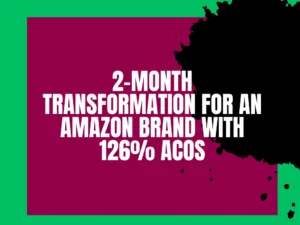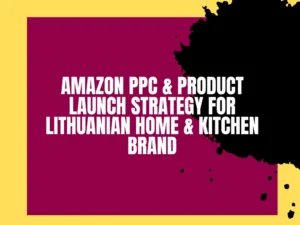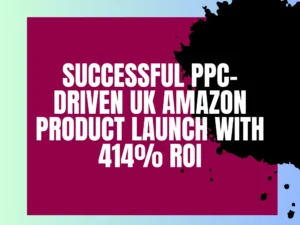Overview:
In an effort to launch a successful Private Label (PL) product with multiple variations in the competitive UK market, our objective was clear: achieve profitability from day one while relying solely on Pay-Per-Click (PPC) advertising. This approach would eliminate the need for giveaways or aggressive discounts, emphasizing the effectiveness of targeted marketing strategies in a saturated landscape.
Results:
The launch was met with considerable success, demonstrating steady sales growth and profitability. On the launch day, 23 units were sold, followed by 35 units on the second day, primarily driven by PPC efforts. The product line expanded from four to seven variations by January 2022, maintaining profitability month after month despite initial costs associated with air shipments. The product ranked highly for multiple keywords, achieving a Best Seller Rank (BSR) under 600 in the main category and under 10 in its sub-category. By early 2022, cumulative sales figures indicated a robust performance, with significant monthly profits and a steady accumulation of over 370 positive reviews, primarily organic.
Key Challenges:
The journey was not without its challenges. Launching with multiple variations (initially four and later expanded to seven) presented complexities, particularly with high minimum order quantities (MOQs) of 1,000 units each. Price positioning was critical; while the product started competitively priced, it later became the highest-priced option in the niche. Additionally, initial product returns and a detrimental one-star review arose from consumer confusion regarding the product’s extendable feature, which was inadequately highlighted in the listing. Rapid scaling was also necessary to avoid stock-outs (OOS), requiring expensive air shipments to fulfill demand.
Approach:
To tackle these challenges, a multi-faceted approach was employed.
- Pricing Strategy: The product was initially launched at a lower price to attract early sales, with gradual increases over time to match and eventually exceed competitors, establishing itself as the premium option on the market.
- PPC Management: A completely PPC-driven launch was executed from the outset, with no reliance on giveaways or promotional tactics. By meticulously managing PPC expenditure, profitability was maintained even while adjusting the product’s price post-launch.
- Listing Optimization & Customer Feedback: Active customer engagement helped address initial feedback. Upon receiving the one-star review, the team contacted the buyer to clarify the product’s extendable feature, successfully converting the negative review into a five-star rating. The product listing was updated to enhance clarity on this feature, which improved customer understanding and satisfaction.
- Stock Management: To mitigate stock-outs, an additional order of 2,000 units was placed on the fourth day post-launch, anticipating higher-than-expected sales. Despite the reliance on air shipments initially affecting profit margins, these measures proved vital for maintaining inventory levels.
- Competitive Edge: A unique product bundle was developed that differentiated the product from competitors, garnering numerous five-star reviews that highlighted the added value of this offering.
Conclusion:
This Private Label launch exemplified the power of a strategic PPC approach, effective stock management, and innovative product bundling. The brand achieved significant organic growth, dominating top keyword rankings and maintaining profitability despite initial costs. Flexible payment terms with suppliers further supported the successful management of multiple launches, paving the way for future expansion into the US market and additional product offerings within the same niche. The success of this launch serves as a testament to the effectiveness of targeted strategies in the competitive e-commerce landscape.





